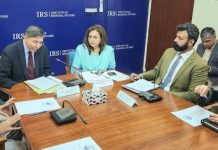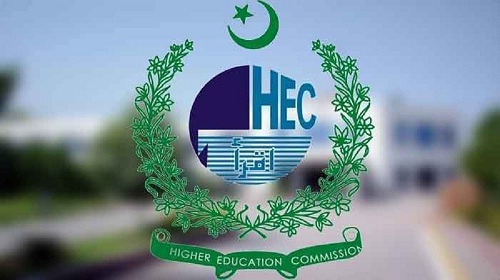Islamabad, Feb 20 /DNA/ – The Higher Education Commission (HEC) has refuted the allegations levelled by Dr. Tariq Banuri in a television programme that disbursement of funds to country’s universities is not done on the formula set for this purpose and that some universities are given preference over the others.
Mr. Banuri has tried to portray the special supplementary grant given to financially distressed universities, which was provided after Court orders and all necessary approvals, as favoritism to these institutions. It is important to highlight that the figure of six billion rupees supplementary grant, quoted by Mr. Banuri in the television programme, is not correct. The ECC approved Technical Supplementary Grant of two billion rupees for financially distressed universities, after the Court Order and not as a favour to any institution.
Since its inception, HEC has been distributing funds allocated by the Federal Government to the public sector universities as per the laid down funding formula. As far as the special grant for financially distressed universities is concerned, the detail is as follows.
In response to a writ petition filed in the Peshawar High Court by few pensioners/employees of the University of Peshawar against non-payment of pension/salaries, the University pleaded that the problem occurred due to inadequate recurring funds provided by HEC. The Court desired personal appearance of the Federal Minister for Education along with Chairman HEC, as well as Federal/Provincial Secretaries for Higher Education and Ministry of Finance.
On appearance in the Court, representatives of the Ministry and HEC explained that 90% problems of these universities are due to poor resource management and historical overstaffing. The Court directed that the officials concerned of the Ministry and HEC should sit together with the Vice Chancellors of public sector universities and come out with viable solution to the economic problem, and it should be reported to the Court within a month.
In compliance to the Court Order, an online meeting was held on March 17, 2021 with representatives of Ministry of Federal Education, Ministry of Finance and selected VCs of all the provinces wherein short, medium and long term solutions were proposed. The meeting was followed by another consultation on March 19, 2021 of the Federal Minister of Education and Chairman HEC with the Governor KP and VCs of the four public universities in Peshawar that have major pension liability of Rs. 1.95 billion. These universities include University of Peshawar, University of Engineering and Technology (UET), University of Agriculture and Islamia University, Peshawar.
During the meeting, it was agreed that aforesaid universities will submit their restructuring/reform plan to ECC whose implementation will be supported through provision of a bailout package. Accordingly, HEC requested the Ministry of Federal Education for provision of supplementary grant to 11 distressed universities in the KP, Sindh and Balochistan provinces.
The ECC approved Technical Supplementary Grant of Rs. 2.0 billon for the financially distressed universities with the direction that funds shall not be utilized for pension purposes. The funds were disbursed to seven most distressed universities of KP and Balochistan province at agreeable amount to each institution based on analysis of the financial data undertaken in a meeting held under chairmanship of Federal Minister for Education in the presence of VCs of universities and representatives of the Ministry of Finance.
Detail of fund distribution to these universities is as follows. University of Peshawar, (Rs. 520 million), Islamia College University, Peshawar (Rs. 204 million), University of Agriculture, Peshawar (Rs. 284 million), UET Peshawar (Rs. 292 million), University of Balochistan, Quetta (Rs. 350 million), BUITEMS, Quetta (Rs. 300 million) and Bolan University of Medical and Health Sciences, Quetta (Rs. 50 million).
Furthermore, previously Mr. Tariq Banuri has also given incorrect statements to the press that he was removed from office because he tried to have the accounts of some research Centers in Karachi University audited that he claimed are supervised by Dr. Atta-ur-Rahman. The facts related to these Centres are as follows.
Prof. Atta-ur-Rahman has held no administrative position in any research center or university for the last 20 years. No centers have been operating under his administrative or financial control since the year 2002.
HEC had requested for academic and financial audit of International Center for Chemical and Biological Sciences. The requests were strongly welcomed by the Center in writing. The only requirement of the Center was in connection with the academic audit—-that it should be carried out by experts in the relevant fields of chemistry and biology, which was reasonable. An academic audit of the International Center for Chemical and Biological Sciences was conducted by 11 international experts in 2018. It was commissioned by the Ministry of Science and Technology and in their report all the 11 foreign experts were unanimous in their praise of the high quality of research work being conducted in the Center, and had recommended additional financial support for it.
The Ministry of Education objected to the funding formula proposed by HEC for all university research centers and pointed out that it was not suitable, without precedence and that it would badly damage research. The issue therefore was never about the auditing of accounts or transparency, as has been wrongly portrayed by Chairman HEC in statements to the Press.
HEC had proposed to take away the autonomy and merge the budget of the International Center of Chemical and Biological Sciences with that of the University of Karachi. This was not possible as the government has a formal agreement with UNESCO that its financial autonomy will be maintained. This was pointed out by the Ministry of Education to HEC in writing.
This Center is the UNESCO Center of Excellence , the TWAS Center of Excellence, OIC Center of Excellence and the WHO Collaborating Center. Its faculty members have won more civil awards and international prizes than any other academic Center in Pakistan, including 1 Nishan-i-Imtiaz, 4 Hilal-i-Imtiaz, 13 Sitara-i-Imtiaz and 8 Tamgha-i-Imtiaz and many honorary doctorate degrees from foreign universities including the University of Cambridge UK. The work of the Center has been praised by many Nobel Laureates https://iccs.edu/page-remarks-of-eminent-scientist The accounts of ICCBS are regularly audited by the government and are well maintained. The Center is headed by Prof. Iqbal Choudhary, a leading scientist of Pakistan, since 2003.

















